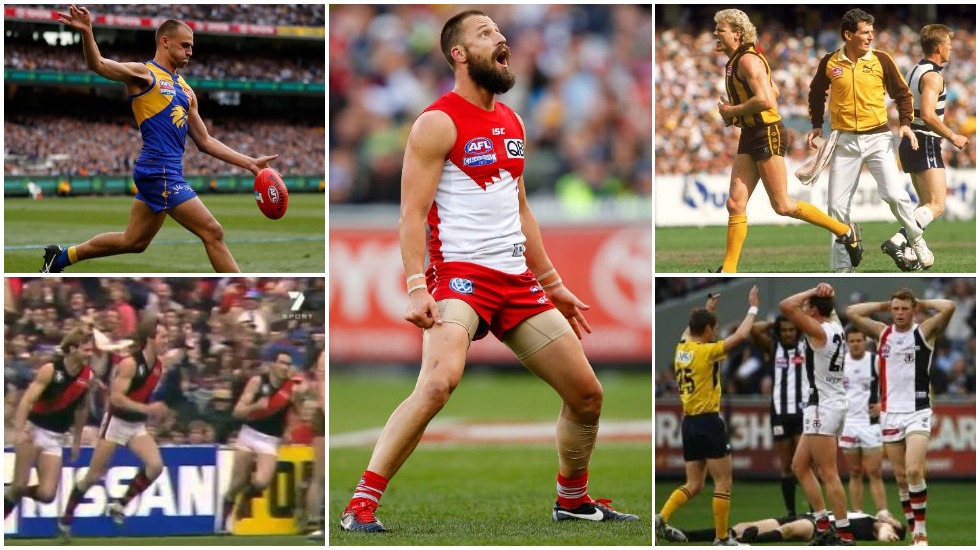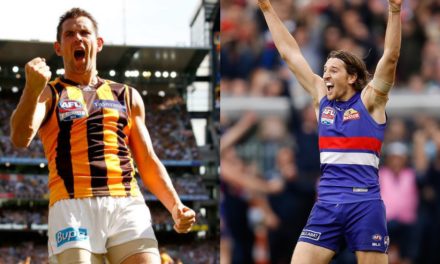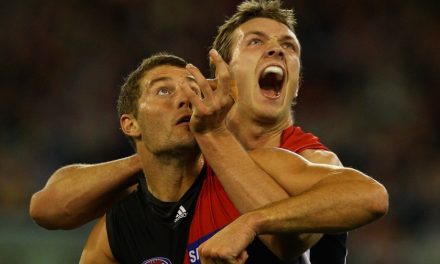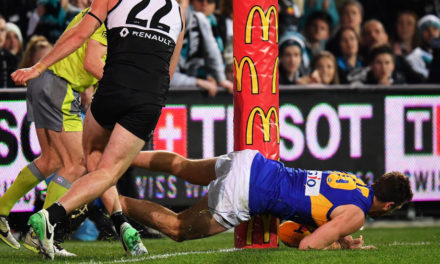Clockwise from top left: Dom Sheed (2018), Nick Malceski (2012), Dermott Brereton (1989), the 2010 draw, Leon Baker in 1984.
What makes an AFL grand final great? Is it the closeness of the contest, the romance of the storyline, or those isolated moments that will be replayed over and over for decades on highlights reels?
Ideally, it’s all those things. Perhaps personal experiences, too. Which is why for any self-confessed footy tragic, grand final day is always a huge occasion whether or not your team is involved, or whether or not you’re there.
And on that latter score, I’ve been incredibly fortunate. Saturday’s big game between Richmond and Greater Western Sydney will be 49th (including two replays) I’ve been lucky enough to attend.
That makes me feel ridiculously old, but I did start young, aged eight. Tickets were easier to come by then. In fact, for a good decade our family got lucky every year simply by filling in and mailing to the VFL a newspaper coupon for series finals tickets.
Then for a few years, when my side was good enough to be playing off in grand finals, I was entitled to tickets via club membership. And since 1985, I’ve been there professionally.
My very first was way back in 1973, when I sat with my brother and father behind the Punt Road end goals at the MCG watching Richmond get their revenge on Carlton for their previous year’s shock loss to the same opponent.
I can still picture the scene clearly in my mind, a hot and quite blustery day. I can still see the naked brutality of incidents like Carlton captain-coach John Nicholls being KO’d in the opening minutes, and Richmond strongman Neil Balme smashing the jaw of Blues’ defender Geoff Southby.
A few years later, in 1977, I sat in roughly the same spot as North Melbourne and Collingwood played out an epic draw, the crowd remaining fixed to their spots for what seemed ages afterwards, digesting only the second grand final draw in 80 years.
That seemed a once-in-a-lifetime event. But amazingly, 32 years later in 2010, I’d be witness to another, this time sitting in the press box instead of the outer, as Collingwood and St Kilda played themselves to a standstill.
I know this will sound like I’m making it up, but I actually did sit in the first couple of rows of the top deck of the Ponsford Stand on grand final day 1979, thus having a better view than 99 per cent of the 113,000 people there of the still-controversial Wayne Harmes incident.
For what it’s worth, I’ve always believed the ball was still in play when he belted it across the goal mouth for teammate Ken Sheldon to kick what proved to be the winning goal against Collingwood.
And when my own team, Essendon, broke a 19-year premiership drought in 1984, I couldn’t have been in a better spot than the bottom deck of the old Southern Stand, right on the wing behind the cheer squad, as all the years of perpetual disappointment melted away in a hail of last-quarter Bomber goals.
That was the last game I’d watch without a professional backdrop, and an appropriate note on which to hang up the old duffel coat.
Not that I’ve necessarily become a lot more sedate even within the confines of the MCG media area. Maintaining professional decorum isn’t that easy when moments of pure sporting drama are unfolding in front of you (see: Dom Sheed’s coolly-slotted match winner for West Coast against Collingwood).
The greatest of all those grand finals? Like I said, it depends on your criteria, but for me, the quality of the actual game trumps the background narrative in importance.
On that basis then, and with some obvious apologies (like, for example, the Western Bulldogs drought-breaking flag of 2016) here are my five favourite grand finals of my near half-century.
And let’s keep our fingers crossed, given that three of my top five are all from the last decade, that the 2019 version also might end up pushing for consideration.
No.1 – 2012: SYDNEY v HAWTHORN
For sheer quality of football, a see-sawing game and a thrilling finish, Sydney’s 10-point win over the Hawks remains the best I’ve witnessed in the flesh. It’s the only grand final to feature not just one comeback, but three, Hawthorn in charge early, the Swans striking back, the Hawks surging again and appearing to have it won before one more dramatic twist. Sydney had peeled off eight unanswered goals to lead by 28 points midway through the third term before the Hawks in a spectacular burst slammed on five in just 10 minutes. They looked home after Luke Breust and David Hale goaled early in the last. But the Swans came again. With Adam Goodes on one leg, they continued to attack, the veteran’s solo effort giving them the lead before Nick Malceski’s unforgettable snap for the sealer with only 34 seconds left on the clock. An epic.
No. 2 – 1989: HAWTHORN v GEELONG
This was a game in which for the vast bulk one team led by six or seven goals, but ’89 is a bona fide classic for a number of reasons, the seasoned pros the Hawks up against the precocious, all-guns-blazing Cats. It had courage in Dermott Brereton’s KO at the first bounce then recovery to kick an inspiring goal, and an amazing individual performance from Gary Ablett, who equalled the grand final record with nine goals. It had brilliant end-to-end attacking and high-scoring, a 42-goal game the second highest aggregate in history. And it had bravery as a whole by the Hawks as they lost a succession of players injured, hanging on desperately by six points at the finish as Geelong piled on eight goals in the final term. No other grand final has been both as tough and at the same time as free-flowing as was the 1989 premiership play-off.
No. 3 – 2018: WEST COAST v COLLINGWOOD
It was Collingwood which made the early running, rattling on the first five goals of the game for a 29-point lead before West Coast, critically, managed two just before quarter-time. The game then became an arm-wrestle, the Eagles chipping away to trail by 12 points at half-time. With Luke Shuey on fire and key forward Jack Darling lifting after a poor first half, the Eagles began to dominate play without putting it on the scoreboard. And the last term was truly epic. Collingwood kicked away through quick goals to Brody Mihocek and Jordan de Goey, only for Eagles Nathan Vardy and Josh Kennedy to quickly respond. And after another 20 minutes of gripping but goalless football, it took the best passage of the game to win it, Jeremy McGovern’s intercept mark kicked to Vardy, Liam Ryan taking a soaring mark, and Dom Sheed accepting a pass only 40 metres out but hard-up against the boundary line, his side two points down. With only 105 seconds of play remaining, Sheed’s deadeye effort delivered West Coast the premiership.
No. 4 – 1984: ESSENDON v HAWTHORN
Hawthorn had beaten Essendon three times in 1984, and early in the second quarter on grand final day, appeared every chance not only of a fourth, but of repeating their record 83-point smashing of the Dons the year before. Gradually, Essendon, with coach Kevin Sheedy throwing the chess pieces all over the board, began to regain its composure, but even at three-quarter time, still 23 points in arrears, victory looked a long shot. But having kicked just five goals to the last change, Essendon washed away 19 years of flagless frustration in a hailstorm of goals, the biggest comeback from a three-quarter time deficit in grand final history. Leon Baker lit the spark, and his second goal of the last quarter and fourth for the game, following a sublime blind turn, gave the Dons the lead for the first time. Hawthorn regained the lead, but Essendon surged again, adding another five goals in time-on for a then record final term 9.6, the largely pro-Essendon crowd roaring in appreciation.
No. 5 – 2010: COLLINGWOOD v ST KILDA
Collingwood seemed to have this in hand with a four-goal half-time lead that should have been more. But Lenny Hayes and Brendon Goddard were colossal in the second half as St Kilda chipped away, the margin down to just eight by the last change. An epic final term ensued, two goals in two minutes to Hayes and Stephen Milne making it just one point. When Goddard soared then goaled on the stroke of time-on, St Kilda was a goal up and it seemed like 1966 all over again before Travis Cloke restored Collingwood’s lead. The final five minutes were as tense as anything I’ve seen in a grand final, a ridiculous bounce of the football eluding Milne and levelling the scores with 90 seconds left. Cue more desperate acts, the siren, stunned faces and the knowledge that while the game couldn’t find a winner, in terms of sporting drama we were all victors.
*This article first appeared at INKL.











